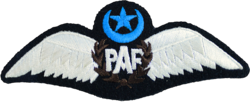
The Mikoyan-Gurevich MiG-21 is a supersonic jet fighter and interceptor aircraft, designed by the Mikoyan-Gurevich Design Bureau in the Soviet Union. Its nicknames include: "Balalaika", because its planform resembles the stringed musical instrument of the same name; "Ołówek", Polish for "pencil", due to the shape of its fuselage, and "Én Bạc", meaning "silver swallow", in Vietnamese.

The Dassault Mirage 5 is a French supersonic attack aircraft/fighter-bomber designed by Dassault Aviation during the 1960s and manufactured in France and other countries. It was derived from Dassault's popular Mirage III fighter and spawned several variants of its own, including the IAI Kfir. In Pakistan's service, the Mirage 5s are modified and are capable of nuclear weapons delivery.

Sarfaraz Ahmed Rafiqui was a Pakistani fighter pilot. He is best known for his gallant actions in two of the aerial dogfights during the Indo-Pakistani War of 1965, and is a recipient of both the Hilal-e-Jurat and the Sitara-e-Jurat military awards from the Government of Pakistan. He is considered as one of the most decorated officers of the Pakistan Air Force as he had the honour to be awarded with the second and third highest gallantry award.
Sitara-e-Jurat is the third highest military award of Pakistan. It was established in 1957 after Pakistan became a republic; however, it was instituted retrospectively back to 1947. It is awarded for gallantry or distinguished service in combat; and can be bestowed upon officers, junior commissioned officers, petty officers, warrant officers, soldiers, sailors, airmen, and equivalents in the Pakistan Army, Navy, Air Force, and various paramilitary forces under federal control, such as the Frontier Corps, the Frontier Constabulary, and the Pakistan Rangers. It may be considered to be roughly equivalent to the Military Cross and the Silver Star.
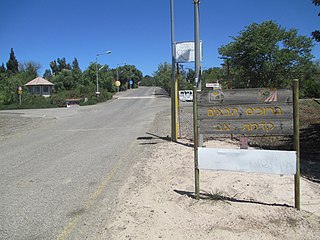
Kidmat Tzvi is an Israeli settlement organized as a moshav in the central Golan Heights. Located to the north of Katzrin, it falls under the jurisdiction of Golan Regional Council. In 2022 it had a population of 578.
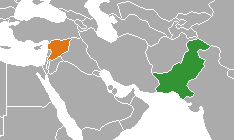
Pakistan–Syria relations are the historic, international, and bilateral relations between Syria and Pakistan. Syria has an embassy in Islamabad. Pakistan is represented in Syria through its embassy in Damascus and honorary consulate in Homs. Through the ancient civilization exchange, areas of modern Pakistan were part of the silk route with the Syria and for centuries, Syrian Islamic missionaries that introduced Islam in the parts of now integrated in Pakistan after 711 AD were from Syria.
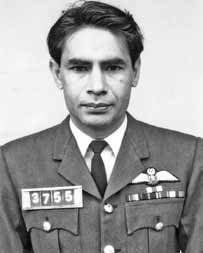
Syed Manzoor ul Hassan Hashmi was squadron leader in the Pakistan Air Force. He served in the 1965 and 1971 wars. He was a recipient of the Sitara-e-Jurat.

No. 9 Squadron, named the Griffins, is a Pakistan Air Force fighter squadron assigned to the No. 38 Multi-Role Wing of the PAF Central Air Command. The squadron is stationed at PAF Base Mushaf, Sargodha. It was the PAF's first fighter squadron and has been commanded by seven Chiefs of Air Staff of the Pakistan Air Force. The squadron crest is a red griffin which suggests strength, aggressiveness, and vigilance. Scrolls around the squadron crest display the battle honours Sargodha 65 and Karachi 71.The Griffins are considered as the PAF's most elite unit as well as its most senior.
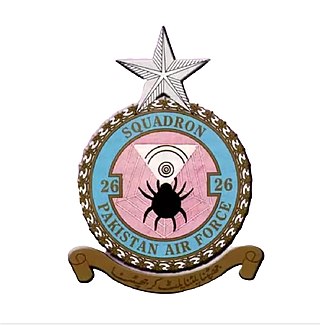
The No. 26 Squadron, nicknamed the Black Spiders, is a multi-role squadron of the Pakistan Air Force's Northern Air Command. It is currently based at Peshawar Airbase and operates the PAC JF-17 Thunder multirole fighter jets.

Saiful Azam (Bengali: সাইফুল আজম; was a Bangladeshi fighter pilot, ace, and politician who first served as a fighter pilot for the Pakistan Air Force and later the Bangladesh Air Force. According to Pakistani sources, during his career as PAF pilot, he shot down one Indian Air Force and four Israel Air Force aircraft. For his actions, he received various gallantry awards from Pakistan, Jordan and Iraq. He also took part in 12 ground-attack missions against the Indian forces. After the liberation of Bangladesh, he joined the newly formed Bangladesh Air Force.
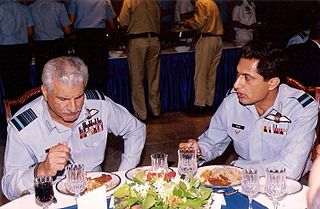
Kaiser TufailTI(M) is a retired Pakistani fighter pilot. Outside of his military service, Tufail is an active blogger, aviation historian and has delivered motivational speeches at TEDx conferences.
Imtiaz BhattiSJ SI(M) SBt in Gujrat, British India, was a cyclist and a former Air Force pilot of Pakistan. He was the Pakistan cycling champion during his student days at Punjab Agriculture College, Lyallpur in late 1940s and early 1950s. He set national cycling records and represented Pakistan in the individual and team road race events at the 1952 Summer Olympics where he was placed 1st among the Asian cyclists and 25th in the world in the 1000 m time trial. Bhatti a veteran of the Indo-Pakistani War of 1965 flew 34 combat missions, the maximum from Pakistan during the war and is credited with confirmed downing of two Indian planes and damaging a third, in addition to participating in raids that destroyed the Amritsar radar and various other air defence and ground support missions.

The Combat Commanders' School or CCS is the advanced air combat tactics development and training school of the Pakistan Air Force (PAF) based at PAF Base Mushaf, Sargodha, Pakistan.
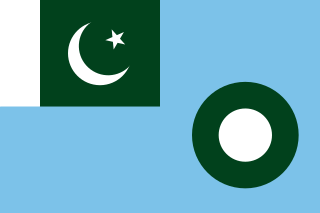
The Central Air Command (CAC) is one of six Major Commands in the Pakistan Air Force, reporting to the Air Headquarters at Islamabad. It is the forefront command of the PAF which handles operational activities near the Indian borders in Pakistan's Punjab province. Central Air Command is headquartered at PAF Base Lahore in the provincial capital of Lahore.

No. 8 Squadron, nicknamed the Haiders, is a tactical attack squadron from the No. 32 TA Wing of the Pakistan Air Force's Southern Air Command. It is currently deployed at Masroor Airbase and operates the JF-17C Multi-role fighter.

The No. 25 Squadron, nicknamed Eagles, is a tactical attack squadron from the No. 34 Wing of the Pakistan Air Force's Central Air Command. It is currently deployed at Rafiqui Airbase and operates ROSE upgraded Dassault Mirage-5EF aircraft.

The No. 23 Squadron, nicknamed Talons, is an air superiority fighter squadron of the Pakistan Air Force. It is based at PAF Base Samungli in the Balochistan province of Pakistan and operates the Chengdu F-7PG aircraft.
Throughout the Arab–Israeli conflict, Pakistan has been a key supporter of both the Arab nations and the Palestinian cause. Pakistan has often provided military support through volunteers, weapons, and special training. Pakistani pilots such as Saiful Azam and Sattar Alvi have fought in both the Six-Day War and Yom Kippur War.
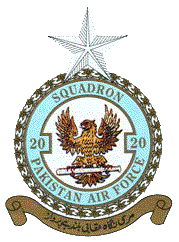
No. 20 Air Superiority Squadron nicknamed Cheetahs is a unit of the Pakistan Air Force established in 1956. It flies the Chengdu F-7PG Airguard jets and is based at PAF Base MM Alam. Initially formed as a photo reconnaissance flight at PAF Base Mauripur, the squadron has evolved over the decades, participating in significant missions and conflicts. It currently operates Chengdu F-7PG Airguard jets and is based at PAF Base MM Alam. The squadron has a rich history, including contributions to the demarcation of the China–Pakistan border, the World Bank's Indus Basin Project, and active roles in the 1965 and 1971 Indo-Pakistani wars. After being disbanded in 1972 and reactivated in 1977, the squadron transitioned through various aircraft, including the Dassault Mirage IIIRP and Shenyang F-6, before adopting the Chengdu F-7P Skybolts and later the F-7PGs. The squadron celebrated its Golden Jubilee in 2008 and continues to play a vital role in PAF's operational activities and exercises.
The No. 18 Squadron is a combat and training unit of the Pakistan Air Force's Southern Air Command (SAC) which operates dual seater JF-17B Thunder multi-role jets out of PAF Base Bholari. The unit serves as an OCU which handles conversion of PAF fighter pilots onto the JF-17 fighter jet. Besides being the twin sibling of the PAF's famous 19 Squadron, it is also the sister squadron to the RJAF's No. 9 Squadron which declared in 1986 has been a sign of brotherly relations between the Jordan and Pakistan and their respective airforces.
